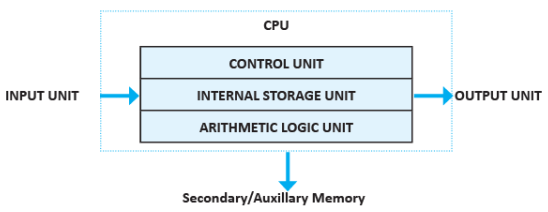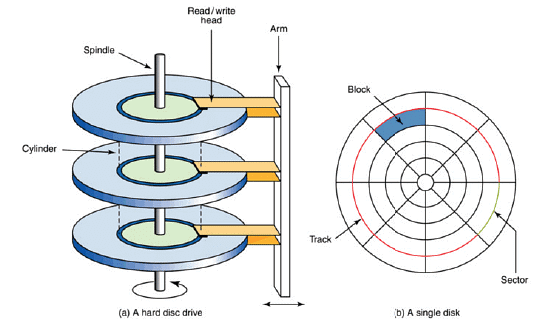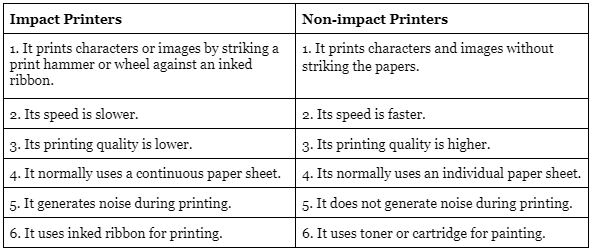Long Answer Type Questions: Computer System | Information and Communications Technology (ICT) for Grade 9 PDF Download
Q.1. Using a block diagram explain how data is processed into information in the Computer System.
The figure below shows the major components of a computer system. It consists of an Input Unit, Central Processing Unit (CPU) and Output Unit.
Working of the components: It is through the “Input Unit” a computer receives data and instruction which get processed in the Central Processing Unit (CPU) and the result or information is shown through “Output Unit”. While doing so the “Internal Storage Unit “ is responsible for holding the input data, intermediate results, output results and program and makes them available for processing as and when required. In case the data, information or instruction needs to be stored permanently for future reference or even after the computer is turned off, the “Secondary / Auxiliary Memory” is used.
Q.2. Describe the memory hierarchies of a computer system.
The different types of memories that forms the Memory Unit of the Computer System are:
- CPU Registers
- Cache Memory
- Main Memory
- Secondary Memory
Q.3. Explain how printing occurs in a Laser Printer.
It makes a laser beam scan back and forth across a drum inside the printer, building up a pattern of static electricity. The static electricity attracts onto the page a kind of powdered ink called toner. Finally, as in a photocopier, a fuser unit bonds the toner to the paper.
Q.4. Explain the concept of Block, Sectors and Cylinder of a Hard Disk with the help of a diagram.
Hard Disk consists of 1 or more metal platters which are sealed inside a case. The metal platters attached to a spindle are magnetic in nature and stores data. Each platter requires two read/ write heads, one for each side. All the read/write heads are attached to a single access arm so that they cannot move independently. Each platter has the same number of tracks(they are like concentric rings), and a track location that cuts across all platters is called a cylinder. A sector is one of the "pie slices" the diskette or disk is divided into. Dividing the circular medium into pie slices is a way to organize it so that data can be located by the read/write heads of the drive.
The hard disk is usually installed inside the computer's case, though there are removable and cartridge types as well. A block is a sector or a group of sectors that the operating system can address (point to). The bigger the hard disk size more the sectors that a block will hold. It is the block where actual data is stored.
Q.5. How is a Impact printer different from a Non-Impact printer? Also give examples of both these printers.



















